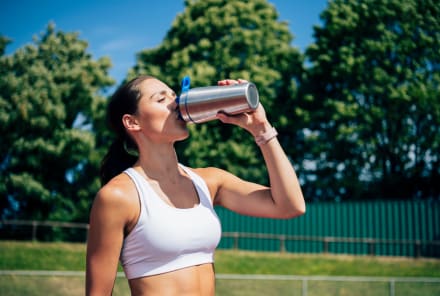Advertisement
How To Reset Your Body Clock, According To An Acupuncturist


Since the start of the pandemic, many people's daily routines have fluctuated. That means waking up later in the mornings and eating and drinking later into the evenings. This lack of consistency can have significant impacts on both physical and mental health.
In Chinese medicine, those disruptions can throw the body clock out of balance, says Gabriel Sher, L.Ac., director of acupuncture at ORA. Luckily, there are some proactive steps you can take to get that internal clock back on track and keep you feeling your best.
What is the body clock in Chinese medicine?
In traditional Chinese medicine, the body runs on a 24-hour clock, and each organ has a two-hour time zone, Sher explains. "During that time zone, the body's chi, or energy, is in that organ," he says. To help bring energy and balance back into the body, he recommends following a schedule similar to the one below.
How to reset your body clock.
5 to 7 a.m.
Organ: large intestine
The purpose of this time period is to gently awaken the body. Because the large intestine is involved, Sher says it's also the time to have a bowel movement. "It's all about elimination of the day before," he says.
Incorporating light stretches and plenty of hydration into these early morning hours may also bring energy into the body and support healthy digestion.
"There's also an emotional component. A lot of people are very stagnant [during this time], so having that routine of a bowel movement can release that. Then you can eat and start your day fresh," he says.
7 to 9 a.m.
Organ: stomach
This time period is all about digestion, so it's also the time people should be eating a warm, nourishing breakfast, according to Sher. "Foods that are warm or cooked are generally easier for the body to digest," he tells mbg. That could include eggs, porridge, or savory oatmeal, and a cup of warm green tea.
9 to 11 a.m.
Organ: spleen
Since you've just fueled up with breakfast and had time to digest your meal, Sher says this is a good time to squeeze in a workout. While meditative movements like tai chi and qigong are often recommended in Chinese medicine, Sher says this time may also be conducive to a more active workout. Overall, he says to listen to your body and find the best workout for you.
11 a.m. to 1 p.m.
Organ: heart
Sher says to eat lunch between the 11 a.m. and 1 p.m. range. The meal should be lighter and smaller than what you had at breakfast, he adds. Since this time period is focused on the heart, this could be a good time to engage in a restorative, internal practice, like yoga or meditation. "We want to stay away from things that cause anxiety," Sher says.
1 to 3 p.m.
Organ: small intestine
Since you've just eaten another meal, the body should have more energy around these hours. This is a good time to focus on completing errands, tasks, or other little projects that need to get done.
3 to 5 p.m.
Organ: bladder
Since this time period is focused on the bladder, it's often when waste is excreted. This is a good time to check whether you're staying properly hydrated. (Here: a helpful pee color chart, in case you're curious.)
"People tend to drink a lot less water during the winter because they're not sweating as much," Sher says, but staying properly hydrated keeps the lungs moist and supports immune function. Along with water, this could be a good time to enjoy an electrolyte-rich drink or a salty snack.
5 to 7 p.m.
Organ: kidneys
During this time, the kidneys are working to clear and filter out fluids in the system, so "movement is key," Sher says. This could be a good time to take a walk or even have sex if you're in the mood!
7 to 9 p.m.
Organ: pericardium
Generally 7 to 9 p.m. is when people will eat dinner, but "you're supposed to start slowing your day down during this time," Sher says. To do both, he recommends eating a light meal that's easy to digest. "A good hearty soup would be a good example, especially during the winter." Think a nutritious chicken soup, beef broth, or root-veggie stew.
9 to 11 p.m.
Organ: San Jiao (triple burner, or triple energizer)
You should ideally be asleep during these hours. This helps the body conserve nutrients for the next day, Sher says. According to him, people can feel paranoia and confusion during this time, and the body is still creating heat. To keep from being overheated, many experts say 65 degrees Fahrenheit is the optimal temperature for sleep.
11 p.m. to 1 a.m.
Organ: gallbladder
"The transition from night to day starts during this window," Sher says. In other words, "yin turns to yang." The body is generally undergoing cellular repair, so you should be fully asleep and relaxed during this time so the gallbladder can properly function and digest fatty foods.
To promote better relaxation, consider getting a massage before bed (this belly massage may support both relaxation and digestion) or taking a soothing bath.
1 to 3 a.m.
Organ: liver
The body should be in a deep, sleeping state as the liver is helping to release the body of toxins. When people stay up too late, this critical time period can be missed, and the body might be more sluggish the next day.
3 to 5 a.m.
Organ: lungs
Throughout the winter, Sher recommends eating pears, apples, figs, and persimmons to keep the lungs nourished and hydrated. Keeping a humidifier in your room can also be helpful during these dry months. "Doing anything to protect the lungs during COVID is really important," he says. Astragalus is a Chinese herb thought to support immunity and lung health. "A lot of people boil it and drink it as a tea," he says.
Bottom line.
"[Chinese medicine] is all about keeping the system healthy and keeping the system regular, and that goes for everything from eating to bowel movement," Sher says. Reestablishing a daily schedule, using the rhythms of the body clock above, can help support a healthy and regular system that may have been thrown off by the pandemic.
Watch Next
Enjoy some of our favorite clips from classes
Enjoy some of our favorite clips from classes
What Is Meditation?
Mindfulness/Spirituality | Light Watkins
Box Breathing
Mindfulness/Spirituality | Gwen Dittmar
What Breathwork Can Address
Mindfulness/Spirituality | Gwen Dittmar
The 8 Limbs of Yoga - What is Asana?
Yoga | Caley Alyssa
Two Standing Postures to Open Up Tight Hips
Yoga | Caley Alyssa
How Plants Can Optimize Athletic Performance
Nutrition | Rich Roll
What to Eat Before a Workout
Nutrition | Rich Roll
How Ayurveda Helps Us Navigate Modern Life
Nutrition | Sahara Rose
Messages About Love & Relationships
Love & Relationships | Esther Perel
Love Languages
Love & Relationships | Esther Perel
What Is Meditation?
Box Breathing
What Breathwork Can Address
The 8 Limbs of Yoga - What is Asana?
Two Standing Postures to Open Up Tight Hips
How Plants Can Optimize Athletic Performance
What to Eat Before a Workout
How Ayurveda Helps Us Navigate Modern Life
Messages About Love & Relationships
Love Languages
Advertisement

This Type Of Fat Is Vital For Women's Health — Are You Getting Enough?
Molly Knudsen, M.S., RDN

New Study Confirms The 3 Habits That Age Your Brain Faster
Molly Knudsen, M.S., RDN

This Type Of Fat Is Vital For Women's Health — Are You Getting Enough?
Molly Knudsen, M.S., RDN

New Study Confirms The 3 Habits That Age Your Brain Faster
Molly Knudsen, M.S., RDN













